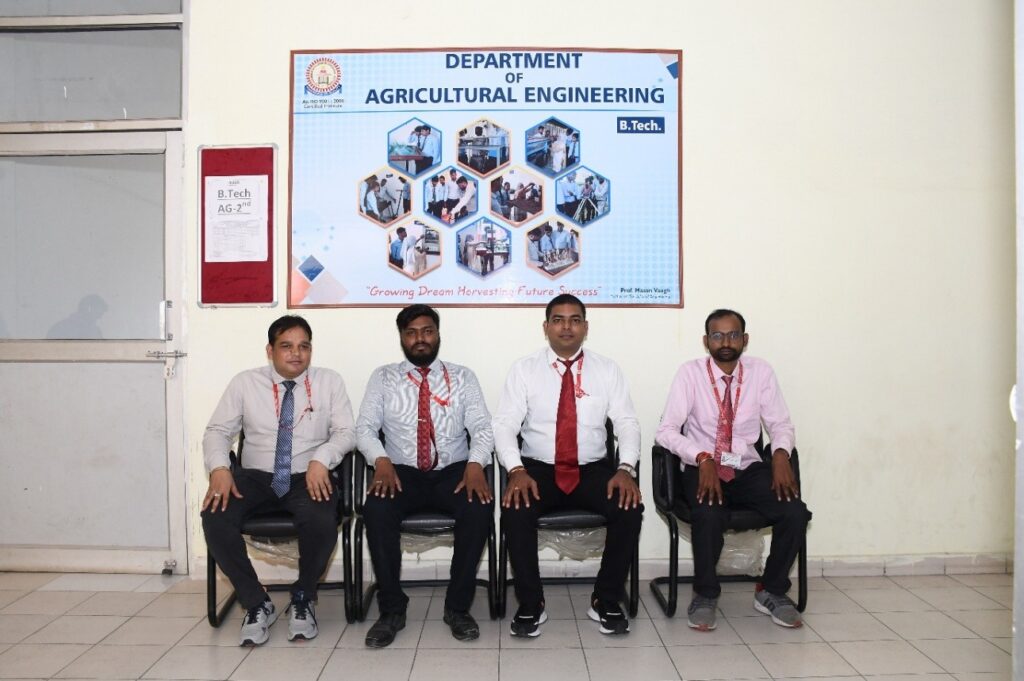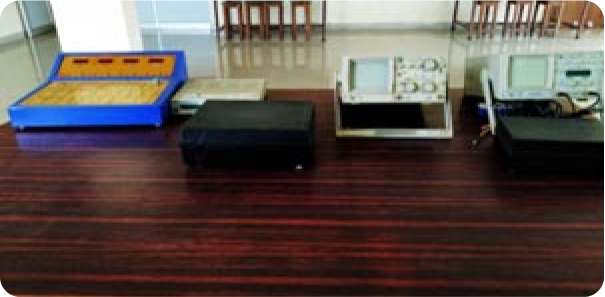
The Department of Agricultural Engineering
The Department of Agricultural Engineering provides academic excellence in undergraduate education programme across a broad spectrum of disciplines in Agricultural Engineering and also point up basic knowledge as well as its application. The entire programme offers and covers the fundamentals as well as current frontiers of technology to meet the educational objectives and prepare students for future challenges in Agricultural sector. We offer our students to practical knowledge regarding the soil and water engineering, farm machinery and power engineering, food process engineering, renewable energy, Hydroponics …etc. as we have well equipped laboratories and advanced library.
Newsletter
Achievements
Departmental Society
Institute–Industry Interaction
Vision of the Department:
To establish the department of Agricultural Engineering as a landmark to accomplish the comprehensive improvement of students and prepare them for global agricultural needs.
Mission of the Department:
M-1: To provide extensive knowledge along with its applications in the field of Irrigation, Drainage, Post-harvest, and Farm Machinery through an effective teaching-learning process.
M-2: To innovate in the field of Agricultural Technologies for the enhancement of all stake holders.
M-3: To produce skilled prospective engineers for the demand of global needs.
M-4: To aware the farmers about cost-effective cultivation techniques for better Agricultural productivity to push up their standards
Program Educational Objectives
(PEOs)
PEO-1: Prepared the Agricultural engineering graduates ready for plans of industry and advanced education.
PEO-2: Instill thorough information in the field of Agriculture from the soil up to the customer.
PEO-3: Fortify the integrative knowledge to help allied fields in agriculture engineering graduates.
PEO-4: Ethically sound professionals with adaptability to gain command of trending knowledge for their development.
PEO-5: To firm the mental abilities of agriculture graduates with social cognizance for vanquishing real-world complications.
Program Outcomes (POs)
(Engineering Graduates will be able to)
PO-1 Engineering Knowledge: Apply the knowledge of mathematics, science, engineering fundamentals, and an engineering specialization to the solution of complex engineering problems.
PO-2 Problem analysis: Identify, formulate, review research literature, and analyze complex engineering problems reaching substantiated conclusions using first principles of mathematics, natural sciences, and engineering sciences.
PO-3 Design/development of solutions: Design solutions for complex engineering problems and design system components or processes that meet the specified needs with appropriate consideration for the public health and safety, and the cultural, societal, and environmental considerations.
PO-4 Conduct investigations of complex problems: Use research-based knowledge and research methods including design of experiments, analysis and interpretation of data and synthesis of the information to provide valid conclusions.
PO-5 Modern tool usage: Create, select, and apply appropriate techniques, resources, and modern engineering and IT tools including prediction and modeling to complex engineering activities with an understanding of the limitations.
PO-6 The engineer and society: Apply reasoning informed by the contextual knowledge to assess societal, health, safety, legal and cultural issues and the consequent responsibilities relevant to the professional engineering practice.
PO-7 Environment and sustainability: Understand the impact of the professional engineering solutions in societal and environmental contexts, and demonstrate the knowledge of, and need for sustainable development.
PO-8 Ethics: Apply ethical principles and commit to professional ethics and responsibilities and norms of the engineering practice.
PO-9 Individual and team work: Function effectively as an individual, and as a member or leader in diverse teams, and in multidisciplinary settings.
PO-10 Communication: Communicate effectively on complex engineering activities with the engineering community and with society at large, such as, being able to comprehend and write effective reports and design documentation, make effective presentations, and give and receive clear instructions.
PO-11 Project management and finance: Demonstrate knowledge and understanding of the engineering and management principles and apply these to one’s own work, as a member and leader in a team, to manage projects and in multidisciplinary environments.
PO-12. Life-long learning: Recognize the need for and have the preparation and ability to engage in independent and life-long learning in the broadest context of technological change.
Program-Specific Outcomes (PSOs)
After the successful completion of the B.Tech program in “Agricultural engineering” the graduate will have
PSO-1: To impart practical knowledge to students to grasp, examine, and develop innovative products as well as provide solutions for the real-life problems of agriculture.
PSO-2: To impart the ability to students to make quality projects work by using multi-disciplinary areas of agricultural engineering such as crop production and soil management including agronomy, horticulture, soil science, plant protection, genetics, plant breeding, and scientific methods.
PSO-3: To impart knowledge to students to use modern techniques, and advanced Agro meteorological methods, to solve industrial and societal problems.
Message from HoD’s Desk

Mr. Prashant Kumar
Head of Department
Area of Interest: Farm Power, Farm Machinery, Post-harvest Technology, Agricultural structures, Tractor Maintenance, Renewable Energy, Ground Water, Rural development.
The department of Agricultural Engineering is a technical and associate department in the field of agriculture. It provides Bachelor Program (B.Tech.) in “Agriculture Engineering” it focuses on an overall growth of students for building the society for the forth coming challenges.
The department focuses on producing the prospective engineers with technical knowledge of new upgradation in the existing as well as newly emerging technology. We are continuously working in enhancing the skill of the students for their betterment and growth in the field of engineering and we carry forward our support and excellent effort. We also conduct various workshops and seminars for an overall development of the undergraduate engineering students.
With Best Wishes
Department of Agricultural Engineering
Agricultural Engineering Faculties

Miss Shahena Parveen
(Assistant Professor)
Area of Interest: Irrigation and Drainage Engineering, Water harvesting and rain water conservation, Watershed Hydrology, Soil Water Conservation Structure, Soil Mechanics and Watershed planning and Management.

Mr. Prashant Kumar
(Head of Department)
Area of Interest: Farm Power, Farm Machinery, Post-harvest Technology, Agricultural structures, Tractor Maintenance, Renewable Energy, Ground Water, Rural development.
Syllabus
Syllabus
B. Tech. 2nd Year
B. Tech. 3rd Year
B. Tech. 4th Year
Newsletter
Achievements
Departmental Society
Institute–Industry Interaction
Laboratories
The Agriculture Labs provide students with various opportunities to learn and conduct experiments, which play a crucial role in the on-going intellectual development of students at any academic level. These labs provide students the time, space, and resources to explore, it also gives a wide range of testing programs for soils, water, plants, bio-solids, and other agricultural materials.
Agricultural laboratories are reflected as a main element of secondary agricultural education, and are well matched to provide students with openings to develop problem–solving skills through experiential learning.
Modern era Labs provide agricultural lab tests in every way regarding the formation of seed as well as learning harvest techniques for prospective engineers pursuing to increase their production. From backyard planters to family farms to viable farmers, NAL tests livestock wastes, grain, fruits, produce, dairy, vineyards, poultry, water, soil, and tissue.
Farm Machinery & Power Engineering Lab
Farm Machinery Laboratory
The Farm Machinery Laboratory is one of the central laboratories of the Agricultural Engineering Department. It mainly comprises of the machinery for seed plantation, inter-cultural operations, soil preparations, plant protection, harvesting and threshing.
The laboratory includes the power tiller operated, tractor operated, animal operated ,self-propelled, stationary engine operated, as well as manually operated equipment. The machineries are being used for practical classes and for all purposes. The cut-sections of different machinery are the main highlights of laboratory which aids to enlighten the students of the different modules.


Farm Power (Tractor Power) Lab
The Farm Power lab has multiple resources of farm power like tractors, power tillers, stationary engines and electric motors. The lab also has the sectional view of tractor and stationary engine which helps in better understanding of the students.
A farm power lab has the all resources which are built to provide students with hands-on experience working with various types of farm equipment and machinery. The lab characteristically comprises of variation of tools and equipment commonly found on farms, such as fuel, clutch, gearbox, differential, steering, electric, etc. enhances the exquisiteness of laboratory.

Irrigation & Drainage Engineering Lab
The Irrigation and Drainage Engineering Laboratory has a capacity designed for students to conduct different experiments related to water management, precisely for the design, study, and optimization of irrigation and drainage systems, this supports in training, and demo. It can be used for water balance studies, irrigation and drainage methods, flow measurement and analysis, water lifting devices etc.
The laboratory is completely equipped with soil moisture checking equipment’s like Tensiometer, Pressure plate apparatus required for irrigation and drainage as well as for soil and crop studies, and this also includes mainly V-Notches, Rectangular Weir, Automatic water level stage Recorder, Pump 0.5 HP with starter fittings and pressure gauge, etc.


Soil Water Conservation & Watershed Hydrology Lab
In the SWCE&WH Laboratory the students are exposed to the various laboratory and field instruments. They analyze the Physical and Chemical properties of soil, In-situ measurement of soil moisture and density, Water quality testing and Modelling Hydrological System using the instruments like Infiltrometer, Self-recording rain gauge, Symons type rain gauge, Cone penetrometer, Speedy moisture meter, Soil Sampler, Soil Testing kit, Permeability Apparatus, digital pH meter with Electrode, Micro pH meter with electrodes, collecting tank, Water bath with the aim of promoting sustainable agriculture and natural resource management.
The lab is staffed by a team of experts in the field of soil and water conservation, and is equipped with state-of-the-art equipment and technology to facilitate students for experimentation.

Post-Harvest Engineering Lab
The Post-harvest engineering Laboratory provides the application of scientific and engineering principles to the handling, storage, packaging, distribution, and sale of agricultural produce after it has been harvested. Post-harvest technology is used to expand the excellence and extend the shelf life of food. It also aids to lessen wastage and expand food safety.
Post-harvest engineering techniques such as cooling, drying, and packaging play a critical role in maintaining the quality of fruits and vegetables. Cooling at low temperatures, drying using hot air, and packaging in MAP can significantly increase the shelf life and improve the quality of fruits and vegetables. These techniques can help reduce food waste, increase profitability for farmers, and provide consumers with high-quality produce.


Fluid Mechanics Lab
Fluid mechanics deals with the study of fluids and the forces acting on them. It is an important field of study for agricultural engineers as it helps them understand the behavior of fluids in various agricultural applications.
The FM laboratory provides training to students in flow measurements, as well as the experiments are designed to help students understand the fundamental concepts of fluid mechanics. The experiments include: Reynolds Experiment, Bernoulli’s Theorem Experiment, Orifice Meter Experiment, Pitot Tube, and U-tube manometer Experiment.
Thermodynamics, Refrigeration & Air Conditioning Lab
Thermodynamics, Refrigeration & Air Conditioning are important components in Agricultural laboratories; It is an essential lab of the curriculum, which provides the knowledge of heat transfer, combustion, engine testing, Refrigeration & Air-conditioning to the students with practical experience in conducting experiments related to Thermodynamics & Refrigeration.
It allows us to control and maintain the temperature, humidity, and air quality of a space, and to preserve and protect temperature-sensitive samples (such as fruits and vegetables) and equipment. By accepting the principles of thermodynamics and the applications of refrigeration & Air conditioning, Agricultural students can ensure the success of their experiments and the quality of their results.


Elementary of Agricultural & Surveying and Leveling Lab
The Surveying and Leveling Laboratory provides students in Agricultural with critical data that helps them make informed decisions about land use, crop management, and resource management. Agricultural graphing is the simplest form of plane surveying. By this survey, the boundaries of fields are correctly located and area is also accurately computed. Land leveling and grading is done with perfection, if the alterations in elevations are known. Configurations of canals for irrigation and drainage can be successfully done by suitable surveying. Surveying plays a major role in laying of underground pipe line system, alignment of irrigation channels, drainage systems, farm roads and farm stead construction etc.
The agricultural engineering and surveying lab builds practical knowledge and experience in students to learn basic principles and techniques of these two fields. Here they also learn regarding the prominence of soil analysis and management, and the design of irrigation systems for effective water use. The purpose is to understand accurate land measurement and mapping for planning and management purposes.
Computer Lab
The use of computers has revolutionized many fields, including agricultural engineering. In this lab, we will explore some basic applications of computers in agricultural engineering, including Programming, data analysis and modeling.
The computer lab in agricultural engineering provided us with an opportunity to learn about the many applications of computers in this field. Students are able to learn about statistical analysis, graphical analysis and how these tools can be used to make data-driven decisions as well as to optimize agricultural production and management practices. The students get exposure to various types of Programming and CAD modeling software such as Python, C, C++, AutoCAD SolidWorks, etc.
By these skills and knowledge students gain the labs benefits which are valuable in their future careers in Agricultural engineering.

Opportunities For Agricultural Engineers
Agricultural engineers work in farming, including aquaculture (farming of seafood), forestry, and food processing. They work on a wide variety of projects. For example, some agricultural engineers work to develop climate control systems that increase the comfort and productivity of livestock whereas others work to increase the storage capacity and efficiency of refrigeration. Many agricultural engineers attempt to develop better solutions for animal waste disposal. Those with computer programming skills work to integrate artificial intelligence and geospatial systems into agriculture. For example, they work to improve efficiency in fertilizer application or to automate harvesting systems.
Agricultural engineers typically do the following
- Use computer software to design equipment, systems, or structures
- Modify environmental factors that affect animal or crop production, such as airflow in a barn or runoff patterns on a field
- Test equipment to ensure its safety and reliability
- Oversee construction and production operations
- Plan and work together with clients, contractors, consultants, and other engineers to ensure effective and desirable outcomes
Industries in which electrical engineers can make career
- Use computer software to design equipment, systems, or structures
- Modify environmental factors that affect animal or crop production, such as airflow in a barn or runoff patterns on a field
- Test equipment to ensure its safety and reliability
- Oversee construction and production operations
- Plan and work together with clients, contractors, consultants, and other engineers to ensure effective and desirable outcomes
Industries in which electrical engineers can make career
- Departments of Agricultural Engineering
- Water management
- Area development projects
- Agricultural machinery manufacturing organizations
- Tea gardens
- Minor irrigation projects
- Food Corporation of India
- National Seeds Corporations
- Dairy, food, agro industries
- National Dairy Development Board
- NABARD and other banks
- Agricultural finance corporations
- Indian Council of Agricultural Research
- Council of Scientific and Industrial Research
- Agricultural Universities
- Non-government voluntary organizations
- Consultancies
- Processing agricultural product

